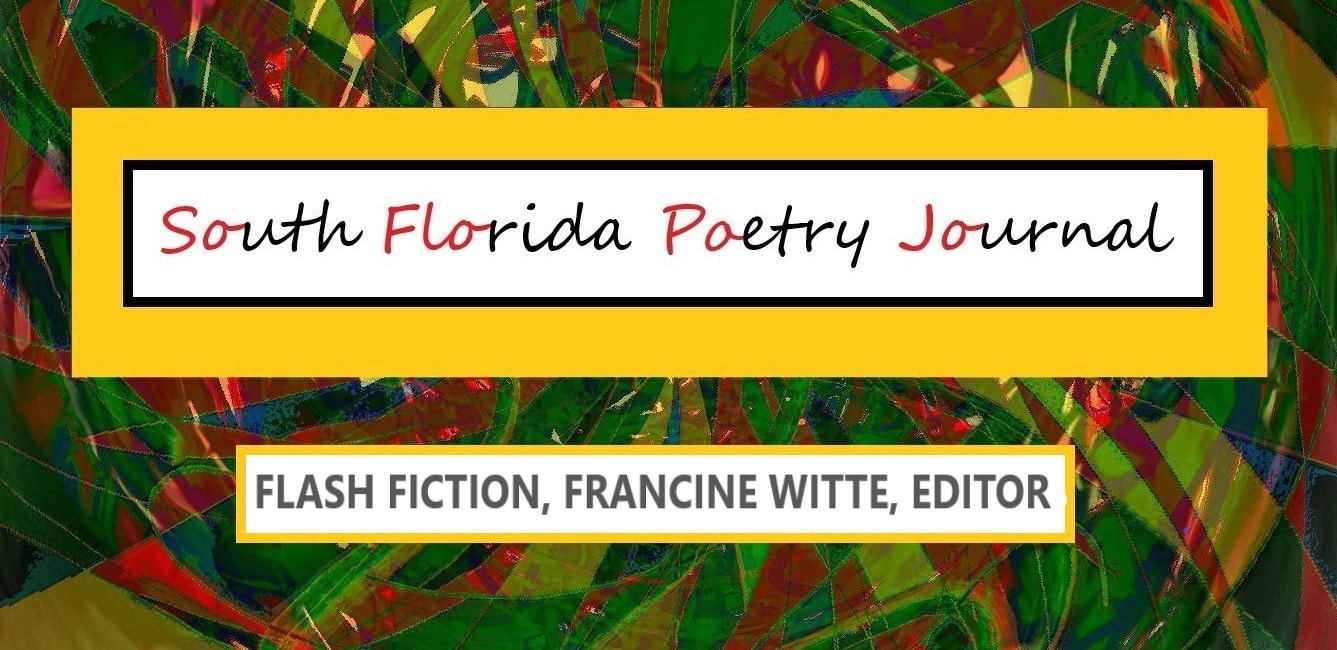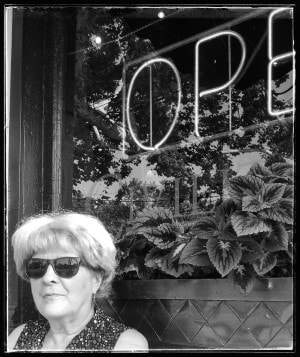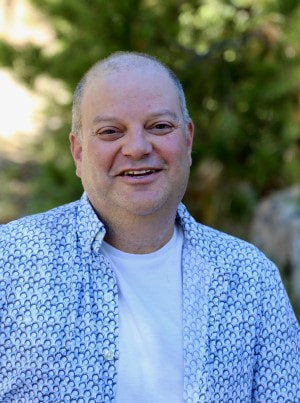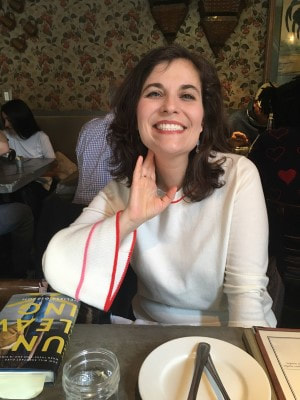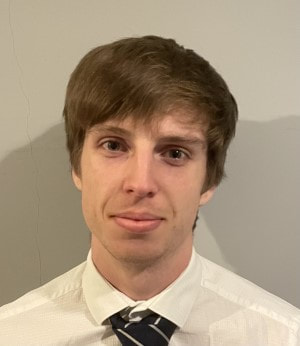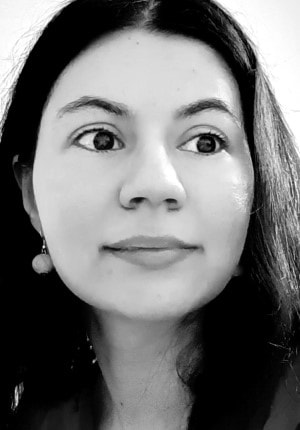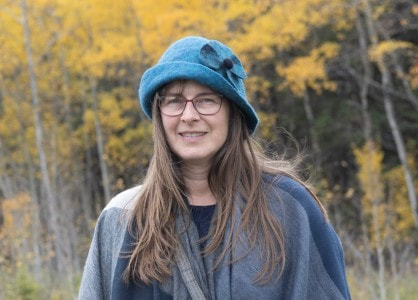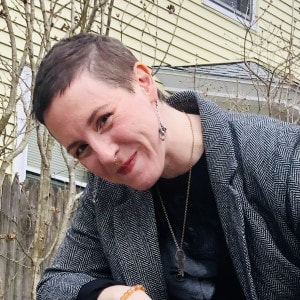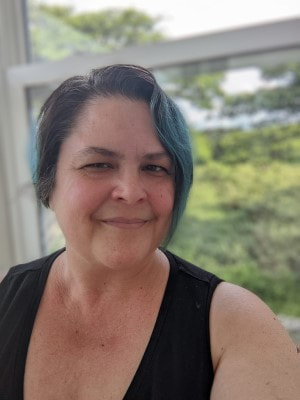Please REGISTER & VOTE in all of your local, state, and federal elections; click here for more information.
SoFloPoJo Contents: Essays * Interviews * Reviews * Special * Video * Visual Arts * Archives * Calendar * Masthead * SUBMIT * Tip Jar
May 2024 Issue # 33 Flash
Daniel Addercouth, Dariana Alvarez Herrera, Frances Gapper, Mary Grimm, Elina Kumra , Matt Leibel, Sam Moe, Melissa Ostrom, Rory Perkins, Shweta Ravi, Angeline Schellenberg, Erin Vachon, Rena Willis
|
Flash Launch Reading
Friday May 10th at 7 PM Eastern |
|
Daniel Addercouth
|
Photo by Sylee Gore
|
Through Him, With Him, In Him
You wonder why they make supermarkets like this, with aisle after aisle of instant noodles and energy drinks and nothing resembling real food, despite the piped-in aroma of freshly baked bread. Not that tinned soup is real food exactly, but it’s the only thing, apart from chocolate biscuits, that your father will eat, now your mother’s no longer there to feed him. You examine the rows of cans, wondering if he prefers Scotch Broth or Pea & Ham. You realise you’re tapping each unwanted tin three times with the first three fingers of your right hand as you replace it on the shelf. You thought you were over this. You remember that time your father caught you pulling your sleeve over your hand before you opened the living room door, and how he spoke to Father Michael. The priest sat with you in the living room with the door closed. The stench of his cigarettes was overpowering. He said you needed to believe God would protect you. Will you try to have more faith? How could you say no to this man who placed translucent wafers in your mouth, whose gestures you mirrored, a trinity of fingers touching forehead, chest and shoulders to form a cross? Good boy. When he left, you pocketed an untouched KitKat from the china plate to savour in your bedroom later. You still remember the crisp snap of the wafer and the sickly sweetness of the chocolate as it dissolved on your tongue. |
Daniel Addercouth grew up on a remote farm in the north of Scotland but now lives in Berlin, Germany. His work has appeared in New Flash Fiction Review, Ink Sweat & Tears, and Roi Fainéant Press, among other places. You can find him on Twitter/X and Bluesky at @RuralUnease.
Dariana Alvarez Herrera
|
Hail Mary
I sat on the kitchen table with an old newspaper clipping in one arm and my son on the other, my nipple in between his lips as he gently sucked. In the paper, there are mugshots of people who have been arrested. I scan for his photo. A 43-year-old, Hispanic male, charged with a DUI. I imagine my father’s agitation at the fact that somebody had revealed his “old” age at the time. Right after my father had been arrested, I had gone on my knees at the confession booth. I told the priest how my father would often come home many cans later, pass out in front of the bed in a position that made him look like he was praying - and perhaps he was - and I’d notice the urine stains forming on his pants. And how I was sorry for these and all my sins. The priest fell silent. “For penance, you’ll do a rosary.” My fingers went through the beads as I made it to the last mystery, announcing the coronation of Mother Mary only to recite another “Our Father.” As my son continued to drink from my body, I looked at him as his father’s drunken snores filled the house. This is my body broken for you. |
Dariana Alvarez Herrera was born on October 1, 2001 in Fajardo, Puerto Rico. She currently lives in Sarasota, Florida where she is earning her BA in Humanities. Her work has appeared in the Elan International Student Literary Magazine, Bridge Eight Press, Oyster River Pages, and many more. Her poem, "Mantle of Hair," has been nominated for a Pushcart Prize.
Frances Gapper
Birdie
While working in the prison vegetable garden, I meet a bird. When the bird drops a feather,
I pick it up. The bird clocks my action and next day leaves me a second feather. To say
Thank You for Bits of Toast and Keep Up Good Work.
More gifts appear day by day. I think the bird steals from other birds.
Propped on her elbow, cellmate Rye laughs at my collection. Making yourself a pair of
wings? You can have them, I offer. Nah, she says.
I’d like a feather coat though. But I’m no good at sewing things together.
Rye touches my wispy scalp. Her kisses are gentle.
Birdie or Chicken Bones I’m called. With sticking-out ribs and pale skin broken and
bruised. Now only ghosts of bruises. I still get the jittery shakes.
One day instead of a feather a blue-stoned ring appears. Bird’s clever eyes encourage me
Pick It Up, It’s Yours. I Stole it For You.
Voice says Danger. But I don’t want to hurt the bird’s feelings.
Danger, Danger. Afraid he’d wake up or might only be pretending to sleep. Blue bud shot
yellow as I touched flame to quilted duvet.
I left the house and walked up the road. Breathing dragon smoke, my hands thrust deep in
coat pockets. His coat. He’ll kill me, I thought. A sign at the corner said Avenue. Things
happen in avenues the same as estates. In the distance I heard sirens.
Voice told me to go back so I did and sat on the front wall. My fingers smelled of petrol.
Wind blew a kaleidoscope of litter, sighed so careless. Bird hopped in pursuit of an empty
bag of crisps. Recognise Me, it asked. No, I said. A police car arrived. We’ll Meet Again
said the bird and flew off.
Black ashes and embers, a spilled purse of rubies. I stood and stared. Quick march, said
the officer, and tapped my head.
Rye turns the ring over and over, making it gleam. Slips it on her finger to admire it.
Sapphire, aquamarine or glass? I don’t suppose it’s worth anything.
Blue like the swimming baths, I say. Blue like a blue star. Remembering Mrs Allen, our
primary school teacher who taught us joined-up writing. And was kind.
I bury the ring next to a line of turnips.
Bird watches me, head cocked. You Remind Me Of Someone. Did We Meet Before, Like
In A Previous Life?
Voice is silent.
Bird plucks a wriggly worm from the freshly turned earth. For You, Egg Sister.
While working in the prison vegetable garden, I meet a bird. When the bird drops a feather,
I pick it up. The bird clocks my action and next day leaves me a second feather. To say
Thank You for Bits of Toast and Keep Up Good Work.
More gifts appear day by day. I think the bird steals from other birds.
Propped on her elbow, cellmate Rye laughs at my collection. Making yourself a pair of
wings? You can have them, I offer. Nah, she says.
I’d like a feather coat though. But I’m no good at sewing things together.
Rye touches my wispy scalp. Her kisses are gentle.
Birdie or Chicken Bones I’m called. With sticking-out ribs and pale skin broken and
bruised. Now only ghosts of bruises. I still get the jittery shakes.
One day instead of a feather a blue-stoned ring appears. Bird’s clever eyes encourage me
Pick It Up, It’s Yours. I Stole it For You.
Voice says Danger. But I don’t want to hurt the bird’s feelings.
Danger, Danger. Afraid he’d wake up or might only be pretending to sleep. Blue bud shot
yellow as I touched flame to quilted duvet.
I left the house and walked up the road. Breathing dragon smoke, my hands thrust deep in
coat pockets. His coat. He’ll kill me, I thought. A sign at the corner said Avenue. Things
happen in avenues the same as estates. In the distance I heard sirens.
Voice told me to go back so I did and sat on the front wall. My fingers smelled of petrol.
Wind blew a kaleidoscope of litter, sighed so careless. Bird hopped in pursuit of an empty
bag of crisps. Recognise Me, it asked. No, I said. A police car arrived. We’ll Meet Again
said the bird and flew off.
Black ashes and embers, a spilled purse of rubies. I stood and stared. Quick march, said
the officer, and tapped my head.
Rye turns the ring over and over, making it gleam. Slips it on her finger to admire it.
Sapphire, aquamarine or glass? I don’t suppose it’s worth anything.
Blue like the swimming baths, I say. Blue like a blue star. Remembering Mrs Allen, our
primary school teacher who taught us joined-up writing. And was kind.
I bury the ring next to a line of turnips.
Bird watches me, head cocked. You Remind Me Of Someone. Did We Meet Before, Like
In A Previous Life?
Voice is silent.
Bird plucks a wriggly worm from the freshly turned earth. For You, Egg Sister.
Frances Gapper has stories in four Best Microfiction anthologies and in Forge, Gooseberry Pie, Wigleaf, trampset, 100 Word Story, Switch, the Dribble Drabble Review, Twin Pies, Splonk, Janus, Fictive Dream and New Flash Fiction Review. Her three flash and story collections are In the Wild Wood, The Tiny Key and Absent Kisses. She lives in the UK’s Black Country, near Birmingham.
Mary Grimm
|
Mother Teaches Us To Play Tennis at Brookside Park
Remember how the hill of trees rose up over the tennis courts like a dense green leafy wave, and we, my sister and I, tiny stick figures batting away at the ball, aware of our inadequacy in the face of mother’s skill and expectations. She’d been a tomboy, as good as her brothers in everything or she’d know the reason why. We dragged our sullen limbs through the hot air under the high early morning sun – couldn’t we stay home and read a book? (No.) She was vital, thick like cream, robust, the swing of her racket a perfect curve we couldn’t imitate. When she was a girl she had come to these same courts down the railroad tracks from the zoo. She and her own sister, Eleanor, had held the courts against all comers, even the men. She told us this story in a happy reflective way and almost those ancient games began to take shape around us, the two of them in their old shorts and blouses darting around the court, the scores ringing out in tinny voices, 30-all, 40-30, 40-love, Eleanor jumping like a monkey on Monkey Island at the zoo and my mother smiling her secret smile, the sun shining on her blonde head, hair done up in a braid. I hit the ball into the proper place, diagonally over the net, and for a minute it was as if I’d been inspirited by her younger self, feeling the strength of her arm, her unerring gaze, and maybe my sister felt it as well, poised on her toes and grinning. But when the ball came back my swing went wide. We could hear the birds in the aviary cawing and hooting. It was time for lunch: cream cheese and jelly sandwiches, with chopped nuts for health, and a thermos of lemonade. Remember how she said you’ll get better, and how we pretended to believe this, and almost did, so strong was the power of her faith in us. |
Mary Grimm has had two books published, Left to Themselves (novel) and Stealing Time (story collection). Her stories have appeared in The New Yorker, Antioch Review, and the Mississippi Review, as well as in a number of journals that publish flash fiction. Currently, she is working on an urban fantasy set in the flats area of a near-future, dystopian Cleveland.
Elina Kumra
|
Aftermath
It was the sweltering summer when the cyclone swept through Basanti, peeling the tin roof off the Sundari Tea Stall, catapulting the samosa fryer through the windshield of an Ambassador in the parking lot, and flinging the spice jar so fast it sank seven chili spoons into the wooden entrance of the Tipsy Peacock Bar across the way. It was the summer of jagged hailstones, deflated rice paddies, and immature grain heads mashed into the sudden silt that dried before the noonday Kirtan could echo from the village temple. There were no jobs for field hands that year, but plenty of work at the Blessings of Kali Construction Company. The college boys toiled in the settlement, nailing corrugated tin and brushing boiling tar across the flat roofs of the public bathhouse and the Spicy Bros Pakora Hut. They sweated and sparkled bare-chested under the sun as we sat in Meena Banerjee’s car in the empty patch where Sundari Tea Stall once stood, sipping cool nimbu pani and rate. It was the summer Mandhata Bose tied her sozzled husband in a cotton sari and thrashed him with a steel karahi until he begged for mercy. She kept swinging until her biceps blazed with fatigue and defiance, leaving everyone in the settlement wondering how a cyclone could render a man helpless to speak or eat or relieve himself without a straw. It was the summer Pramod Banerjee, the neighbor next door, abandoned his wife and daughter, grabbed half the insurance payout from his hail-bashed farmhouse and his dented Ambassador, then drove all the way to Sikkim to gamble his life’s savings on a pair of jacks among seasoned players who knew how to brush off a fool who insisted they call him “Lucky.” It was the summer Ravi Sen fell, bare-bottomed, on the restroom floor of the Tipsy Peacock after a stray mongoose shot out from the toilet. Both the animal and the man were uprooted and traumatized by the storm. The man more so by the sudden absence of his inherited obligation—the tea stall his father had built. It was the summer we saw Mandhata Bose and Ravi Sen fall in love over a dish of fiery pakoras at the Spicy Bros Pakora Hut. A mouthful of spice and newfound freedom saw them run off to Sikkim to start their own clothing business with a buy-one-get-one-free sales policy and a high-stakes card game in the back where Pramod Banerjee lost all his money. The tiny room above the shop boasted a small fridge and a large bed where they woke whenever they wished and with no husband or father to rebuke them. It was the first summer in over a decade we saw Meena Banerjee’s mother grin. Mrs.Banerjee used her half of the insurance money to become her own boss, finding that ten years of marital disappointment had sharpened her ability to evaluate unemployed field hands and village boys gone astray. She put them to work spreading hot tar, all while teaching Meena how to balance the books and work an insurance policy and measure a man. It was our final summer of submission. When tradition snapped like old wood in a cyclone of chaos and consequence, and though our parents argued we were too young to get it, we realized sometimes a cyclone is just what a town needs. |
Elina Kumra is a BIPOC writer in San Jose
Matt Leibel
|
Played Off By Orchestra
There are too many people to thank. I’d like to thank my lovely agent Claudette, my lovely wife Darla, my three lovely daughters, and the word “lovely” itself, for being an acceptable catch-all for this scenario. I’d like to thank my producers, while being fully cognizant that this particular thanks may not age well in years to come. I’d like to thank God, without whom none of this would be possible, or who may not exist at all and therefore may have nothing to do with this. Or who maybe told me to tell you He doesn’t exist, just to throw you off the trail—since like most in this town, He values His privacy immensely. I’d like to thank the three other more famous performers who turned this role down, on account of the money wasn’t good enough, or they thought the script was rubbish, or they didn’t want to wear the prosthetics, or they didn’t want to participate in the potentially-humiliating nude scene. I’d like to thank the writers, who for once wrote a non-garbage script—and to assure them that the time I crossed the entire thing out line by line and then fed each sheet into the shredder it was only to motivate you toward the ultimate perfection (or close enough) of the final product. I’d like to thank the director, for giving me the latitude to develop my character through improvisation, and seemingly endless takes, though really, what choice did you have, after those other showboats turned you down, and probably more besides, and to be honest there would have been a precipitous drop off in quality if I were axed from the project, and I think we all know this. I’d like to thank the makers of certain highly efficient drugs whose names I am legally forbidden from mentioning, which gave me the strength to work 18-hour days for upwards of two months without completely—and bleep this if you must—losing my shit. I’d like to thank the polar icecaps, for not totally going to slush before I could get my mitts on this statue; I realize that’s a massively egocentric view, and I encourage all of you to do your part to save the planet—but also, if an iceberg were to become sentient, develop a love of the craft, study at Julliard, and eventually earn its way onto this stage (perhaps for best calving scene) would it care all that much about stepping on my toes? I think not. I’d like to thank my 7th grade History teacher Mr. Camares, who encouraged me to think big, and not limit myself—and when that turned out, in my then-interpretation, to involve dressing up as Genghis Khan and bringing a replica Mongol sword to class, immediately sent me to the school counselor to get straightened out right quick. I’d also like to be honest and thank the luck of the draw. I’d like to further thank Palamedes, the Ancient Greek prince who reputedly invented dice, without which luck would not be possible, or at least a lot less fun. I’d like to thank my well-documented gambling addiction, for ebbing just long enough to get me through this project without blowing my entire payday on a roll a spin a draw or a Hail Mary. I’d like to thank the sweet, exuberant innocence of childhood, and the voice in my head, back when I was just a scrawny nine-year-old who could barely put one foot in front of the other, that told me to stick with it, and that someday, with enough dedication and faith, I could be in the position I’m in now. And I’d like to tell each and every one of you out there to follow your dreams no matter what─ but I can’t, in good conscience, do this, because many of you should absolutely NOT be following your dreams. And it’s really just the slightest bit embarrassing to watch you try. And to my wife—I dearly apologize for mentioning Claudette’s name before yours earlier on in this speech. That...was an unforced error on my part. Hopefully baby, we can get past this. Thank you all again. Yes, yes, I realize that my time is up. You can let go of my arm now. No one gets to where I am tonight without understanding exactly when their time is up. |
Matt Leibel lives in San Francisco. His short fiction has appeared in Electric Literature, Portland Review, Passages North, Quarterly West, Wigleaf, DIAGRAM, Socrates on the Beach. and Aquifer: The Florida Review Online. He has been nominated for a Pushcart Prize and included in the anthology Best Small Fictions 2020.
Sam Moe
|
The Saint
You knew you were in love the first day of winter on the beach. Cold surf, his wife ahead with golden retrievers who wouldn’t stop barking at seals, her scarf bright and red as a blood blister, black hair tied back in a neat bun, your friends on either side of her, the two of you walking slowly behind. You knew you weren’t supposed to be alone together, not after she found you whispering over an old photo album from his teenage years when he and his friends dressed up as different saints reenacting biblical events. There were his hands, shakily captured in the moonlight, mid-prayer. His ex-girlfriend, eating macaroni with lump crab, grinning as a poorly-made halo tilted off her head, its surface coated in tinfoil. — Everyone was holy, back then, he was saying, and we all made wings out of newspaper and super glue. I’d always wished to be a saint. She cleared her throat in the doorway and the two of you separated, unaware any distance had been eaten in the first place, everything warm and amber as grilled lemon rinds. Or perhaps you knew over dinner, when she sat him next to you, the rest of the faculty devouring their flank steaks and scallops, the dean of translation studies joking about taking pomegranate glaze shots, short ribs and enoki mushrooms, someone brought horseradish cream, someone made mussels with tomatoes, potatoes, and deep green brine. There were words embossed on the forks and the knives, your silverware reading Seeds and Butter, the inner curve of his steak knife bearing Beg, Mercy, Hurt. The beef Wellington bleeding out of its doughy case, red peppers belly-up in the moonlight, everyone wearing duck boots, everyone from Boston. — You’re making a fine addition to the English department, she said, bright white teeth biting into baby beets and in that moment you knew she’d never been without money, never needed the dentist, she probably never got chicken pox or ran out of breath when she exercised. — I’m grateful to be here, you replied, unsure why you were talking about this now, late January, when months had gone by with meetings and wine, chopped blackberries and her gaze at your back. You were tender, you were his rib straight from his empty stomach, constantly filled with sadness, always pining after the wrong person. — Thank God we finally hired someone who publishes literature, he said. At this, his wife frowned, pushed parmesan around her plate. You wondered why she didn’t eat the eggplant and get the insults over with. Instead, she asked you for a hand in the kitchen. His fingers, warm on your thigh, illicit touch beneath the table, your colleagues staring at you like you were a reincarnated rabbit they’d killed earlier in the road, everyone with roast-you gaze, wanting to turn your body into portobello pot roast, seafood cioppino, another excuse to drink. Her kitchen was summertime. Dried leaves woven throughout the ceiling, dishes printed with surf curls and sand dollar discs, a spider having survived New Year’s Eve scuttled above your head. — I’m sorry about what happened to you. You wondered what she was talking about before realizing she’d been reading your memoir. You could see her now: glasses on the bridge of her nose, body slouched in her father’s armchair, pieces of your memoir printed on colorful paper, particularly resonant lines covered in circles, strike-throughs, question marks. She made her way through the early years, the violence in the old barns, the forests which threatened to swallow you whole, your mother who told you to die. — I don’t know what you mean, specifically. As in, dare. As in, say it. The words, the happenstance, the violence with many names. She took a step closer; you wondered what you must look like to the others. Two women in North Face jackets with stain-free blue jeans, amber duck boots, one blonde and the other raven-haired. Her hand on the side of your face. From the outside of the kitchen, she seemed gentle. Caress from an older faculty member, a woman, as if to say, been there, screwed him. Destroyed lives before you even set foot on this campus, ruined jaw bones before, everyone knows a professor is a witch in hiding. They don’t see the way she grips, digging her red nails into your flesh, with the same nails your mother had. |
Sam Moe is the author of two poetry books, with two more forthcoming in 2024: Animal Heart (3-Day Chapbook Contest) and Cicatrizing the Daughters (FlowerSong Press) and she has received fellowships from Longleaf Writer’s Conference and Key West Literary Seminar, as well as writing residencies from VCCA and Château d’Orquevaux.
Melissa Ostrom
|
Alphabetical
Edie says it’s bad luck she got a job in Murray, one that now, nineteen years later, pays too much for her to quit. Marie Greco never left their hometown either, not even the old neighborhood, two streets up from the empty factory on the river. Edie and Marie have known each other since third grade, the year the Grecos moved to Murray. In the decade that followed, Edie’s last name of Grobawski guaranteed the girls’ closeness—literal closeness, since alphabet-oriented seating charts, gym teams, and group activities regularly lumped them together. Edie recently decided the G of their last names is the only thing she and Marie have in common. Still, every few months, usually after running into Marie at Tops Market or Goodman Diner, she finds herself agreeing to a get-together and heading across town. Though Edie moved into an apartment on Price when she turned twenty, Marie lives where she grew up: same buckling brick street, its macadam patches like bald spots, same green two-story house. Her parents moved to Tall Pines Home three years ago, but Marie acts like they’re still sitting in the living room recliners. She winces if the screen door slams, bracing for Mr. Greco’s scold. Last time Edie stopped by, the weekend after Memorial Day, Marie was planting red impatiens in “Mom’s window boxes.” She said she couldn’t wait for the hummingbirds to find them. Edie imagined her coming back from her job at the post office and sitting on the porch swing without swinging it, staying motionless in the presence of whirling wings. She pictured this from a behind-the-scene angle, a little of Marie’s pointed profile poking out from her best feature, a wealth of dark hair. Just how she always saw Marie Greco, who sat one desk ahead. |
Melissa Ostrom is the author of The Beloved Wild (Feiwel & Friends, 2018), a Junior Library Guild book and an Amelia Bloomer Award selection, and Unleaving (Feiwel & Friends, 2019). Her stories have appeared in many journals and been selected for Best Small Fictions 2019 and 2021, Best Microfiction 2020 and 2021, and Wigleaf Top 50 2022. She lives with her husband, children, and dog Mocha in Holley, New York. Learn more at www.melissaostrom.com or find her on Twitter @melostrom.
Rory Perkins
|
Before I Attended My Brother’s Wake
Before I identified his body and tried to guess if he had done it on purpose. Before he stepped in front of the train and I learned death didn’t have to have a reason. Before he came round to talk and I turned him away. Before my wife left and ended up in his arms, his bed. Before my wife was my wife and we thought marriage would fix our problems. Before my mother stopped talking to me and I had my first bump of cocaine. Before the world stopped and I no longer trusted my own voice. Before words became too much, even “Yes” and “No”. Even “Love”. Before mum told me she hated the sound of my voice and my brother went searching for a father he would never find. Before she kicked us out at fifteen and we realised being similar was not the same as being there for one another. Before we raced to the bottom of the garden and played at pushing each other into the river. Before that, mum always got our names mixed up and I didn’t have to question who she loved more. |
Rory Perkins is a British writer focusing on shorter works. He has been published in Vast Literary Press, Eighteen-Seventy, CandleLit Mag, and Artam's The Face Project (forthcoming).
Shweta Ravi
|
And Again
Her picket fences are collapsing into powdered ephemera. She pats unfeeling walls like flesh coaxing the crevices to spit out the missing pieces of her heart. Is she looking for an exit? He dusts off debris like dandruff, his falcon eyes ambling away while she pushes underneath the gravel, the rubble and stucco gagging her gossamer wings. He returns like an accidental husband, even admires the new hydrangeas in her potting shed. She begins to feel purposeful about everything that makes her life purposeless. Later, she ogles in glee at his bronze laurels on pedestals, the knights and angels doing a bum-waggle dance in the wind until they teeter to a halt, staying like she stayed with nothing to stay for. |
Shweta Ravi (she/her) is an educator and writer from India. She was shortlisted in the Strands International Flash Fiction Contest. Her work has appeared in literary journals like Bending Genres, Reflex Fiction, Hearth & Coffin, Feral Poetry and Versification.
Angeline Schellenberg
|
The Tilt
The city was tipping faster now. She could see chunks of aluminum on the riverbank, fish flopping on the far shore. Soon the high rises would come down. Downtown had been evacuated for months already. She held the empty bike rack to steady herself. She wished the Tilt had waited until after her in-person meeting with her replacement brother. Their first FaceTime had been a hoot. But he’d had to leave the city because he wasn’t vital. She was here for the long haul, directing the crews doing the demos. This week’s was the longest power outage so far. She rubbed her twitching eyelid with her free hand. The stress certainly hadn’t made her feel any younger. She’d just wanted to enjoy herself, to feel like she had a family again, without the world crashing down around her. With the last of her battery, she sent his final message into the cloud. |
Angeline Schellenberg is the author of the Manitoba Book Award-winning Tell Them It Was Mozart (Brick Books, 2016), the KOBZAR-nominated Fields of Light and Stone (UAP, 2020), and Mondegreen Riffs (At Bay Press, 2024). She works as a contemplative spiritual director, the second shooter at Anthony Mark Photography, and the host of Speaking Crow: Winnipeg’s longest-running poetry open-mic. AngelineSchellenberg.wordpress.com
Erin Vachon
|
Dead is a Beat We Cannot Outpace
Remember when we found the dead shape wrapped in a blue tarp in the mall downtown, driving up the parking garage ramp to catch the late showing at the IMAX, sandwich baggies of candy secure in our pockets, lubed-slick asphalt strobing white under the headlights, when the rainstorm misted our hair to frizz in air-soaked night, driving circles toward three hundred sixty degrees in high definition, life at the max, spinning the wheel, windows hand-cranked down, forearms draping out, tape deck rolling, bottles rattling in the foot well, kicking our sneakers at Mountain Dew empties and sweet-punk paperbacks, tires turning silent as the reaper? Remember, how we hit the ramp? The quick turn to face a pick-up truck idling, lights blinding? A blue tarp wrapped around a shape in the front seat? Is that a dead body, screech, pull up, stop, that’s a person, engine running, I’m not getting out, you get out, I’m not getting out, drive past, press the gas, turn back, drive slow, pass by, real quiet, silent blue body, press the gas, faster, jogging toward the glass doors, we are waving at the guard, candy dropping from our pockets, dead tarp, wrapped blue, stiff cadaver, maybe not, dead shape wrapped in blue, they'll check it out, we watch a blockbuster, blue caped hero flies, victim dies but justice wins, drive out, no one checked it out, truck idling, silent blue, drive down the ramp, parking kiosk, ticket please, truck’s still there, we told someone, we reported it, justice justice justice, security vans fly up the ramp, we skid out, past tense, witness us gone, but a blue tarp was really all we saw. Isn’t that right, a shape was all we saw that night? Because when we talked last week, fifteen years had passed, and you’d forgotten even that. Laughed a little, said, No, I don’t remember that at all. A blue shape in the night? Then spin the wheel again. Pretend we changed the ending, and the future was ours to bend. We hit the ramp. Blue tarp. Pull up. You'll park. I won't get out. You get out. So I do: get out. Open the door. Trip on bottles. Stumble slow. Headlights on. Radio static. Driver’s side. Body buckled to the wheel. We're the ones spinning. Blue tarp wrapped up. Hoodie over knuckles. I'll knock, Hello in there. You'll say, We’ll miss the movie. I'll say, There is no movie. Unlatch the door. You'll stumble back. I'll say, Can you hear me? You'll say, Call the police. I'll say, They're no heroes in any story. Injustice. Injustice. Injustice. Poke the tarp. Body screams. We see its true face on every screen. Yours. Mine. Tarp. This is the movie. Bodies, solid and empty. And when we talk next week, you'll accuse me, How could you? How could you open the door? Three hundred sixty degrees in surround sound, an endless blue wraps around me. The movie just never stops playing. |
Erin Vachon is a Submissions Editor at SmokeLong Quarterly, a 2023 Writer-in-Residence at Linden Place, and a 2023 Recipient of the SmokeLong Fellowship for Emerging Writers. Their work has been featured in the Wigleaf Top 50, and nominated for the Pushcart, Best Small Fictions, Best of Net, and Best Microfictions. Their writing appears in Black Warrior Review, SmokeLong Quarterly, DIAGRAM, Hayden’s Ferry Review, and Brevity, among others. You can find more of their work at www.erinvachon.com.
Rena Willis
|
Tortuguero
Let’s say the house is on fire, and I’m dreaming that I’m watching turtles hatch on the beach in Tortuguero where we spent our honeymoon, black sand clinging to my thighs and your cheeks. With each hatchling that emerges you appear farther away until I could hold you between my index finger and thumb, and I grow older until I am bent double, my skin is thick and tough as leather and our children are still young, yet they are older than I am because they were born that way, with their bodies aimed at the sea. They struggle across the sand; pink faces raw, lips tight, tongues burning. They know they must go and that I cannot follow. The house weeps tears of fire from the rafters. The walls pop and crack like my spine when I try to stand but I am buried in the exact spot where you whispered you loved me while we watched the hatchling turtles inch their bodies across the sand. I blink and you are gone again, disappeared over the horizon. We didn’t mean to start the blaze, but exhaustion made me indifferent, and frustration made you cruel, and our house is in flames, smoke crashing over me in waves as our hatchlings stretch their necks and ignore the burning sand along their bellies. They hurl themselves into the sea and I am kneeling on the floor of our bedroom, ash coating my fingers as I flick another photo into the fire. |
Rena Willis is a writer and an educator. Her fiction work has appeared in 'Headland Journal', Five on the Fifth', 'New Flash Fiction Review' and others. She loves new ideas and encourages different perspectives. She is the Founder and Director for an International K-12 school in Costa Rica where her passion for writing and her love for learning intersect. She strives to make a positive difference in her community and in the world. She believes we succeed together.
